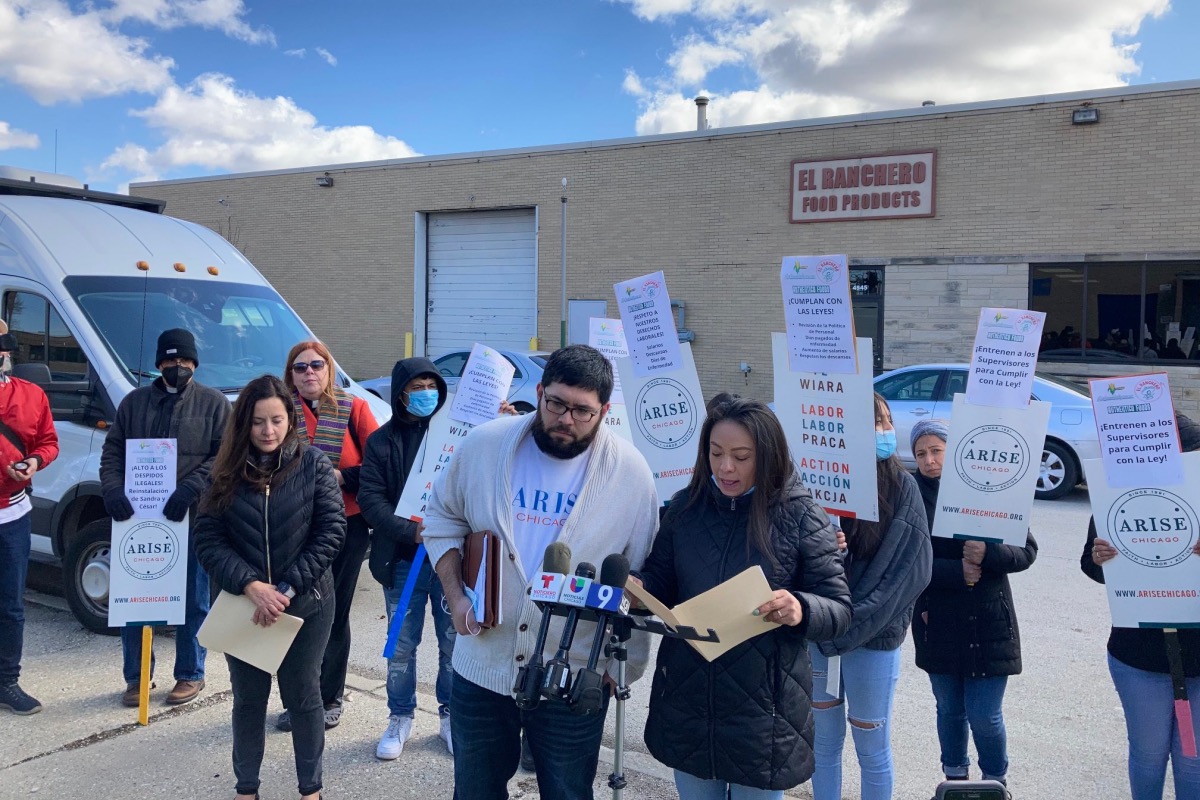

Sandra Fernandez, one of the worker leaders who was fired after working for Authentico Foods for four years, speaks at a press conference, Chicago, Illinois, Thursday, April 14, 2022. “The company must answer for its actions. I am here to shine the light on the reality of what it is like to work at El Authentico. We are fighting for a more just workplace,” she said. (Arise Chicago)
CHICAGO — On Monday, workers at El Milagro announced various campaign victories as well as additional demands. Three days later, another Chicago tortillería is making headlines. Workers at Authentico Foods, which produces tortilla chips and tostadas under the El Ranchero brand and tamales and masa under the La Guadalupana brand, began organizing in March after hearing about the efforts of the workers at El Milagro.
The Authentico Foods workers sought to address multiple workplace issues including abusive managers, low pay, and insufficient breaks. When the company fired worker leaders rather than address their concerns, the workers followed in the steps of the El Milagro workers and contacted Arise Chicago, an advocacy group focused on workers’ empowerment.
In a press conference on Thursday, the workers were joined by religious leaders; Raise The Floor, a worker alliance and support center; and organizers from Arise Chicago.
“It’s unconscionable that, after two years of the pandemic, companies like these are still refusing to negotiate with their workers,” said Reverend Juan Gutiérrez of North Shore Baptist Church.
Worker Sandra from Authentico Foods: “The company did not give us proper breaks, the managers were abusive and workers were afraid. But we are afraid no longer. We are standing up for our rights!” pic.twitter.com/l8ifb8ReO1
— Arise Chicago (@AriseChicago) April 14, 2022
Sandra Fernandez, one of the worker leaders who was fired after working for Authentico Foods for four years, tried talking to the company about the lack of breaks and verbal abuse from managers. On March 19 she worked her entire shift, and at the end, a manager told her she wasn’t needed anymore. When she asked why she was being fired, the manager told her they had to let her go because they were remodeling.
“I am very sad for my 15-year-old daughter, sad because I had to cancel my daughter’s quinceañera. We already had a room booked and everything, but now, without a job, I have no way to pay for it,” Fernandez said.
She tried explaining to the manager that her daughter’s quinceañera was coming up, but they didn’t care. Sandra had already purchased the dress, but now she needs the money to survive.
Alejandro Castro, president and CEO of Authentico Foods, said in a statement: “We don’t comment on employee concerns. We have an open-door policy through which our employees are welcome and encouraged to discuss and resolve their concerns with management. We value our employees and always have their best interests in mind.”
Laura Garza, Worker Center director for Arise Chicago and an organizer with over 20 years of experience, said she was in awe of Sandra’s bravery. “It was her birthday yesterday, and she spent it in our office preparing her statement for today.”
“The company did not give us proper breaks,” Sandra said during Thursday’s press conference. The managers were abusive and workers were afraid. But we are afraid no longer. We are standing up for our rights!”
Mexican Workers Organizing Against Mexican Employers
Walk into any Mexican supermarket in Chicago and you’ll find aisles lined with El Milagro, El Ranchero, and La Guadalupana products. These are not just staples in the homes of Mexican families but are often the same products offered at the many taquerías and other Mexican restaurants across the metropolitan area.
These brands tell stories of their Mexican immigrant founders who achieved success in Chicago, a narrative that appeals to their Mexican consumers and workforce.
This is not the first time that Mexican workers stand up to Mexican elites despite their shared identity, however. During the Mexican Revolution of 1910, Mexicans from the state of Morelos organized against the rich hacienda owners. Led by Emiliano Zapata and known as the Zapatistas, their main cause was agrarian land reform, which would grant them more control over the farms they worked on, provide for a more equitable distribution of profits from the harvest, or simply allow them to grow only what they needed to feed their families.
Zapata was a reader of the newspaper, Regeneración, and was heavily influenced by its founder, Ricardo Flores Magón, Mexico’s leading anarchist at the time.
“Take into account, laborers, that you are the only producers of wealth,” Magón wrote in the pages of Regeneración on September 3, 1910. “Absolutely everything is made by your creative hands, and nonetheless you lack everything. You weave the cloth, but you walk around almost naked; you harvest the grains, and you hardly have a miserable crumb to take home to your families; you build houses and palaces, and you inhabit huts and attics; the metals which you drag out of the earth only serve to make your bosses more powerful and your chains stronger and heavier.”
Since the Mexican Revolution, the gap between the rich and the poor has widened, both in Mexico and the United States.
Sandra Fernandez sees it.
“These small family-run companies think they can make their own laws,” she told Latino Rebels.
Sandra was excited to work for a small Mexican company, thinking she would fare better than working for a large corporation. But since being fired, she’s changed her mind.
“What hurts most is that it’s my own people who treat me like I’m disposable,” she said.
***
Arturo “Tootie” Alvarez is based in Chicago. He trucks. He writes. Not at the same time. Twitter: @TootieAlvarez



Muchas gracias por haber cubierto la noticia. Es hora de que esta compañía deje de maltratar , de violar los derechos de los trabajadores y de romper las leyes.
Gracias por su apoyo